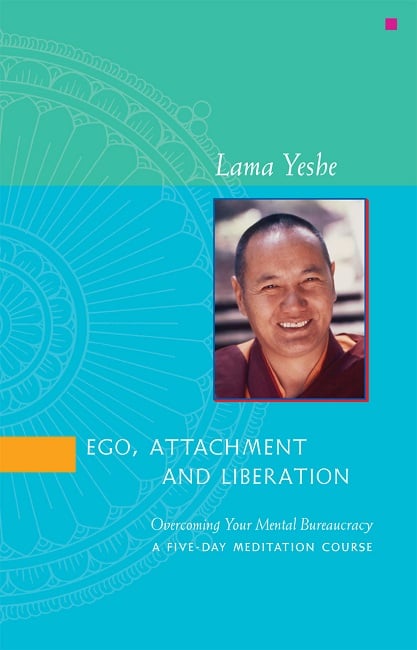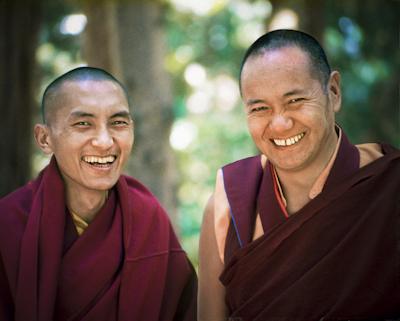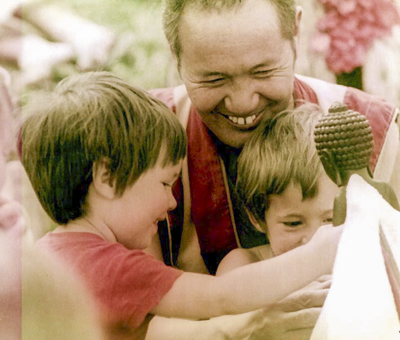Dear Archive Friends,
Thank you so much for your kind interest in and support of our work. Please share this e-letter with any and all! And remember, if you have any difficulties forwarding this email, or if you want to see any of our past issues, you can find them in our e-letter archive.
Our Latest!
 The books I mentioned in the last couple of e-letters, Lama Yeshe’s The Peaceful Stillness of the Silent Mind (reprint) and Ego, Attachment and Liberation (new), are being printed; Ego, Attachment and Liberation will be sent out next month to all members and benefactors. (By the way, you're a "benefactor" if you've made a donation of $20 or more in the last year; see our Donations page for more information.) You can also visit our Membership page for more information about that special program.
The books I mentioned in the last couple of e-letters, Lama Yeshe’s The Peaceful Stillness of the Silent Mind (reprint) and Ego, Attachment and Liberation (new), are being printed; Ego, Attachment and Liberation will be sent out next month to all members and benefactors. (By the way, you're a "benefactor" if you've made a donation of $20 or more in the last year; see our Donations page for more information.) You can also visit our Membership page for more information about that special program.
If you are neither a member nor a benefactor but would like our new book, you'll be able to order it on-line in a week or so. In the meantime, you can order any of our current titles—and become a member or benefactor in time to receive the new book automatically.
Audio and Video
For those of you haven’t seen our Lama Yeshe DVDs, we’ve posted Part 1 of Lama Yeshe’s Introduction to Tantra on our YouTube channel. Check it out!
This month's podcast is another excerpt from Lama Zopa Rinpoche's teachings in Barcelona, Spain in September of 2005. You can listen online through our Online Recordings page. This teaching begins with a hilarious story told by Rinpoche about "tibetan rice"; listen in and you'll understand what I mean.
The Buddha and Vegetarianism
I recently read an excellent and inspiring book, Food of Bodhisattvas, which was written by the great Shabkar Tsogdruk Rangdrol, where he makes a wonderful case for not eating sentient beings (better known as meat) based upon many quotations of Guru Shakyamuni Buddha as found in several sutras. I was surprised not to have known before that the Buddha had spoken out so strongly in favor of vegetarianism. If you have any doubts about this, please read the book. [Published by Shambhala Publications in 2004, this book is now out of print.]
Advice from Rinpoche
Some people have asked what practices can be done to help pacify the violence in the world today and to help elect wise and compassionate leaders. Lama Zopa Rinpoche says that regular group or individual recitation of the Sutra of Golden Light can accomplish both goals. Please let us know if you decide to do this and what your experiences are of doing so.
And speaking of advice from Rinpoche, the Online Advice Book continues to grow. This month we've added a number of advices to the Death and Transitions section, including advice for practices at the moment of death. We have also made a number of additions to the Retreat Advice page. We now have over 380 advices posted.
 New Additions to our Website
New Additions to our Website
We have just added a series of drawings by Lama Zopa Rinpoche to our Photo Gallery, much like the one you see here. We hope that you've been pleased with the new format of the Photo Gallery. Please let us know what you think, and also let us know if you have any photos you'd like to submit to the Archive.
Our newest addition to the website is the series of teachings from the 12th Kopan Course in December 1979, which includes extensive lectures from Rinpoche, and a lecture from Lama Yeshe.
I would like to thank our fantastically wonderful technical computer staff, Jennifer Barlow and Sonal Shastri for the great stuff LYWA brings you on our website: Teachings, Lama Zopa Rinpoche's Advice Book, the photo gallery, audio teachings, the members' area...pretty much everything! Thank you Jen and Sonal.
Seminars Near and Far
I’ve been asked to lead a seminar on impermanence and death in Cincinnati, Ohio during the weekend of October 13–15. It's titled Life, Death, & After Death: A Buddhist Approach.
To celebrate the wonderful activities of what Lama Yeshe used to call Universal Education and is now called Essential Education: Universal Compassion & Wisdom for Peace, which is hosting some meetings in the USA this month and next, we offer below a talk Lama Yeshe gave at an Australian teachers’ college in 1975.
Thank you again so much for your kind interest and support.
Much love,
Nick Ribush
Director
On Educating Children
On Lama Yeshe’s 1975 visit to Australia, one of his students, a trainee teacher, invited Lama to his college to talk to some of the other student teachers.
The purpose of education is to benefit people. We all know this. However, different countries have their own ideas of what constitutes benefit according to their individual inclinations. What some countries consider to be bad education, other countries consider good. In other words, what makes education good or bad depends on how one interprets good and bad.
These days, people live in so many different environments, societies and communities—rural, urban, industrial, intellectual and so forth—that education itself has become confused. For a start, no one person can learn every existent technology; that’s obviously impossible.
Therefore, the decision as to what constitutes a good education depends very much upon personal interest, but ultimately we have to decide whether what we’re learning benefits us and helps us benefit others. If we’re not clear about this from the beginning we can embark on one course of study but finish up thinking, “Oh, this doesn’t help,” and drop it, then try something else but that doesn’t work either; then something else again…we go on so many educational trips but eventually finish up empty.
I think everybody—especially people in the West—should at least receive a basic, general education in such things as writing, mathematics, cooking, gardening and housekeeping. Those things are essential. If we simply focus on theory and technical education and ignore the practicalities we won’t even be able to make ourselves breakfast. That’s not realistic.
Life in the modern world demands we know the fundamentals—how to prepare food and how things work. The benefit is security. What use is abstruse technology if we suddenly find ourselves alone? We could die of hunger. Don’t think it couldn’t happen; in this world we can never be sure. And don’t think it’s easy to survive because we have money. Money isn’t everything.
Therefore, an education in the basics of human necessity is essential. Studying technology without knowing the fundamentals of survival can be very dangerous.
When it comes to teaching others, we have to take into account and foster our students’ abilities and interests and try to develop those qualities in the classroom; if we don’t, the students just get bored or upset. Especially at this time, it’s not wise to teach in an authoritarian, dogmatic way—“Sit there! Learn this!” Children nowadays are very intellectually free and don’t respond well to force. So we have to arouse their interest. Skillful teachers know how to make their students interested in the subject being taught, whatever it is; that’s a uniquely human ability. Simply pushing students isn’t just unwise; it doesn’t work.
In Tibet, we taught students language, philosophy, science and so forth from the beginning but we always made sure the students were interested first. We never pushed. As a result, they’d feel that education was their responsibility, not something that only the teacher wanted, and thus they learned easily. You can’t teach students through force.
Being a teacher is a big responsibility. But learning alone doesn’t make a teacher; we have to know how to interest our students in what we want them to learn. If we don’t, it’s impossible to teach. A good teacher should know each student’s individual character and temperament and how to work with that. If the teacher’s attitude is “My way is the only way,” and the student’s is different, it becomes a problem.
Another quality that a good teacher should have is equanimity. Good teachers don’t favor those students who make them happy and forget about or reject those who are slow, temperamental or difficult to communicate with. That’s not right. If the teacher gives off a good vibration, has a good relationship with all of his or her students, makes them interested in the subject and benefits their life, that’s wonderful.
However, there are unskillful teachers who put students down and focus on their bad side: “He is this and that; she didn’t learn anything; his character is bad,” and so forth. If you put people down, they’ll feel insecure, but it’s natural for people to have shortcomings—we all do; it’s not just this one child. Don’t think that some people are unaffected by criticism; it’s not true.
Also, we all have different aptitudes. We learn some things quickly and others slowly; we understand some things the instant we hear them but find others incredibly difficult to grasp and to integrate with our own experience. Therefore we have to expect that because everybody’s mind is different, some students will find certain subjects difficult and others easy. But, given time, most students can learn most things and we shouldn’t give up on or denigrate those who don’t get something the first or second time.
So teachers should have the skill to treat students as individuals and not generalize that they’re all the same. No two personalities are identical; each person’s ability to learn is different. Also, some people have a tendency to judge others on superficialities without knowing what they’re like inside, but others’ inner abilities can be very difficult to comprehend; most of the time we don’t even know our own abilities.
Check your own educational experiences. You probably found some subjects unbelievably easy to understand while others were still incomprehensible even after repeated study. Why was that? Your own experience should help you have patience when you teach.
Sometimes educational systems are fixed but standardized systems don’t always work, so be careful when deciding which approach is best for your students. Methods and curricula have to change with the times.
It’s also important to encourage your students and make them feel that they’re capable of success. When you do so, they make progress and see their own development for themselves. That’s very important. If, instead, you always emphasize your own ability and learning and tell students, “This is the way I teach and this is the way you learn,” you disempower them, which is clearly the wrong thing to do. It’s just your own power trip.
With education, students gain their own power, and with that you can teach them more. It’s hard to teach people who are completely dull and foolish. Therefore, try to show your students how great their own abilities are. When they understand that, they’re so happy and continuously progress. If you put them down—“You’re stupid, hopeless”—they just get nervous and insecure and feel that they can never learn, and further education becomes impossible. When people believe it’s impossible for them to learn, it becomes impossible for them to learn.
Confident students are the ones who make the best progress. When students think, “Yes, I can do this,” they advance. Even when set complicated tasks they feel that in time they can gradually accomplish them.
And if students have special needs and can’t be taught intellectually, you can teach them non-verbally through art or physical movement. Their IQ might be low but their sense perception allows them to easily understand what they see.
It’s especially important to explain to children why they should get an education; as I mentioned before, you can’t force them to learn. If they understand the reasons they’ll take more of an interest in their studies and be much easier to teach. They don’t necessarily have to understand all the logic for and benefits of learning, just some. Anyway, if you simply tell them they have to study “because it’s the law” or “because I want you to,” they’ll just ask “Why?”
That’s true. Kids today aren’t easy. They always want to know why. It’s not like it used to be in the old days. Think of the traditional English methods of education. Children had no choice; they had to do as they were told. Teachers didn’t have to explain anything; they had all the power and used it. But that was in the past. These days children are more intelligent and skeptical, and teachers seem to have lost the power they used to have—it has moved a little more to the students’ side. Perhaps they’ve unionized! Anyway, the conclusion is to give students logical reasons for why they should get educated.
It’s not easy to be a teacher. Good teachers take responsibility for their students’ lives. Perhaps this doesn’t happen so much in the West but that’s how it was in Tibet. Our teachers felt very responsible for they way their students thought and behaved and in general tried to ensure that their lives were constructive and uncomplicated. But even though Western teachers today have less influence over students than they used to, they still have some.
Therefore, as much as you can, give off good vibrations and come from a place of sound philosophy rather than misconception. Many teachers’ ideas are total misconceptions and when this is reflected in their unconscious behavior it adversely affects their students: they adopt their teachers’ erroneous ideas and copy their bad behavior. I’m not just being negative; it happens. So be careful how you think and act.
A teachers’ influence extends well beyond what you teach; your character is also very important. I don’t mean that you should just be superficially diplomatic; I mean that you should feel deeply responsible to communicate well with your students and really understand them.
It can be quite difficult to choose the kind of life you want to lead. Before deciding upon the subjects that you want to study you have to look ahead and choose a career that will give you the money you’ll need to live the way you want. For many people this means a life of luxury, so you have to see what kind of education will lead to that. That’s not always easy.
For example, I’ve seen many people choose their education, get their degree, be successful but still finish up unhappy with their job. Therefore, if you’re going to be a teacher, you need to be very wise and skillful in your approach so that the education you give others is beneficial for them and yourself as well. And as I said before, the way to give the best education to others is to approach them as individuals and make them interested in what you teach. You can’t teach everybody the same subject. There’s no one best thing.
I know that in some places the syllabus is fixed and that’s what you’re expected to teach rather than something that accords to your students’ interests. But if you’re wise you can still loosen it up rather than teach it in a concrete way; you can spice up the set topics with things that your students will find interesting. That’s possible.
The bottom line is that if your students are happy with what you teach, they’ll learn.
And now, if there are any questions I’d be happy to try to answer them.
Q: Lama, here we’re training to teach children aged five to thirteen. At the beginning you suggested teaching the basic necessities for life; could you tell us briefly what those basic necessities are?
Lama: What I meant was that you should have the sincere wish to help your students and when you teach you should do so peacefully, not aggressively. That will rub off on your students and they’ll remember you for the rest of their lives as somebody who taught beautifully, with patience. Furthermore, your kindness will be reflected in the way they act; they will pass the warm feeling they got from you on to others. Children always copy their teachers so you have to impress them the right way.
Of course, you can explain the purpose of the actual education but you can also tell your students that that’s not all there is; that there’s something else. You can tell them that they should have warm feelings for and dedicate their lives to others; that selfishness brings only unhappiness. You can definitely explain that kind of thing.
The human mind is really beautiful. If you act positively your students will automatically absorb that. They may not have the conscious thought “He’s good,” but that’s the effect you’ll have on their subconscious. So you don’t have to say, “Studying math is the only way to be happy.” That’s completely silly; they’ll laugh at you. Instead, you can say something like, “Math isn’t that important but you might need to know some when you go shopping.” Explain the need in a simple way; then they won’t be confused. Explain things in a very down-to-earth way. Some teachers exaggerate the importance of what they’re teaching and that just confuses their students’ minds. Of course, sometimes teachers themselves are confused and pass their confusion on to their students. Then the students go home and confuse their parents, their parents confuse the rest of the community and confusion is generated all round.
Q: Lama, does the practice of meditation give you the peace and stability to remain calm in spite of confusion?
Lama: Yes, it does. Meditation shows you what’s happening within your mind. It shows how your past experiences influence the present and how your present experiences will affect you in the future.
Q: Who controlled children’s education in Tibet? Here, the government’s in charge.
Lama: We had different kinds of school. Some children went to medical college; others were trained in monasteries. In general, most Tibetan children were educated in the monastery.
Q: Western children watch much TV and have many more distractions than Tibetan children, but can we still start teaching them meditation at such early ages as five or six?
Lama: It depends. If a child has a violent, uncontrolled mind and finds it impossible to keep still in class, even at the age of ten or twelve, perhaps you can teach him to relax his body, his physical nervous system, with some kind of simple meditation technique. It can be very natural. You don’t have to believe something to meditate; it’s more to do with mind and feeling. You can simply teach children to concentrate on some part of their body: their stomach, heart or head, for example. And you can make it a game; just let them see what they experience for an hour or so. You don’t have to push them: “Meditate!” You can also teach such children to recite mantras. That can also help a lot.
But for students who don’t have that kind of problem and are studying well, you don’t need to teach meditation or mantra. It’s only for those who are complicated and with whom it’s hard to communicate.
Q: I’ve tried teaching children mantras but once they master it they seem to get bored very quickly, like in five or ten minutes.
Lama: Yes, that can happen, but don’t make them do it all the time, just occasionally, and never for a long period. If children concentrate strongly for even a short time it can be very powerful because they don’t intellectualize as much as we do.
Well, I think that’s all. Thank you; thank you very much.
Lama Yeshe gave this talk at Kedron Park Teachers College, Queensland, on April 29, 1975. Edited from the Lama Yeshe Wisdom Archive by Nicholas Ribush.
For advice from Lama Zopa Rinpoche on children's education, visit the Educating Children section of the online Advice Book.
































